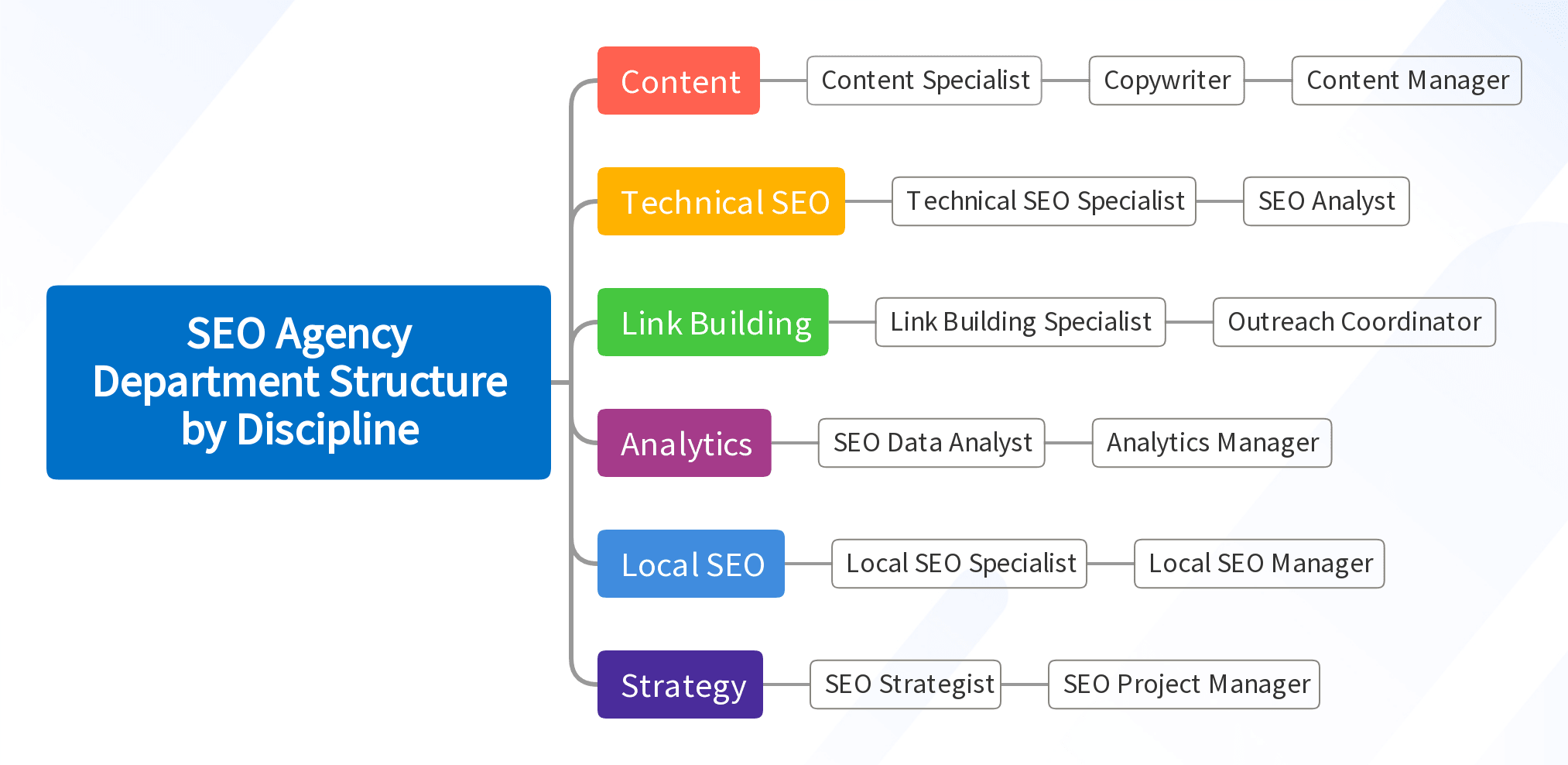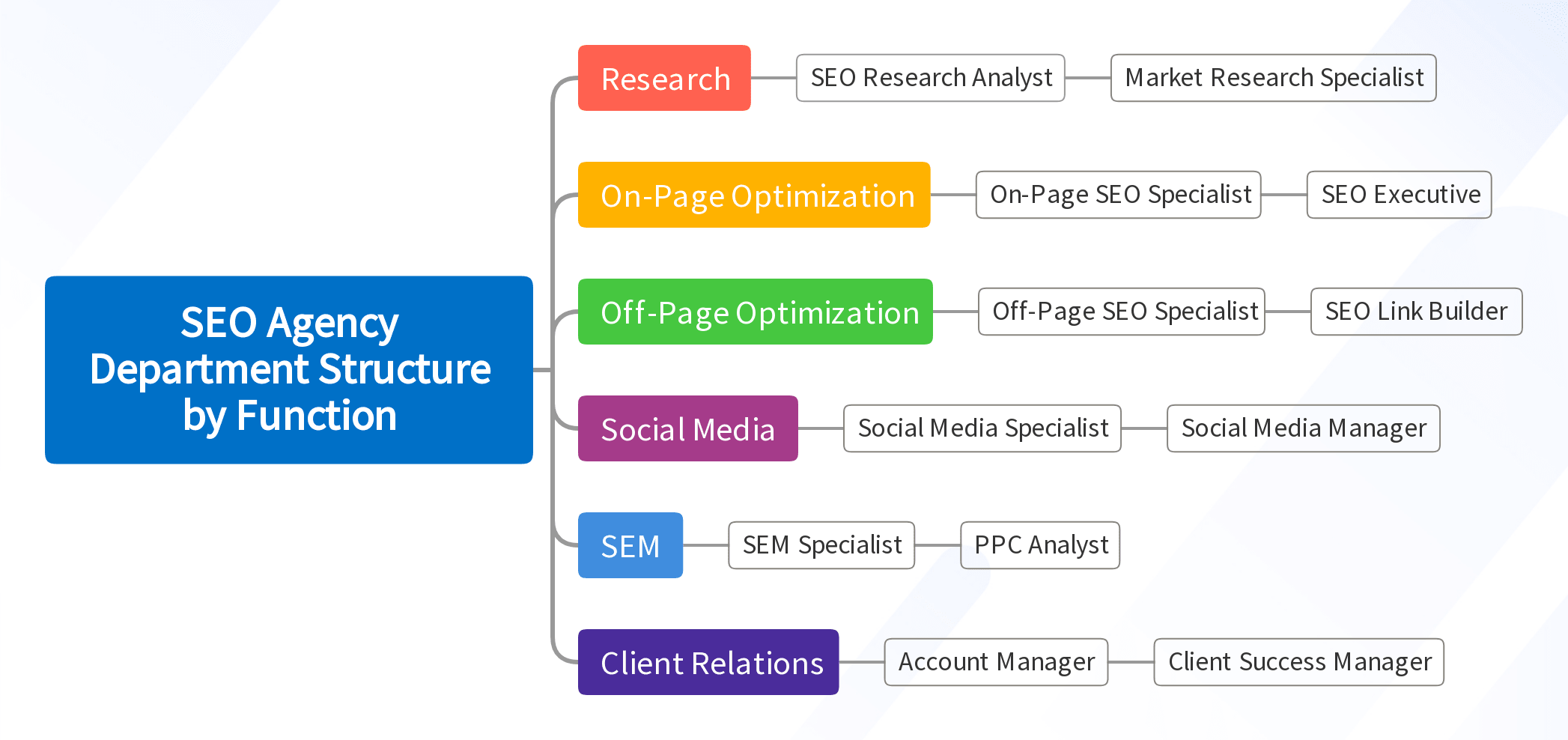

SEO Agency teams are pivotal players in the fast-paced business world. They navigate the complex realm of online presence, ensuring visibility and reach.
Their structure is a blueprint of efficiency. Each role, each individual, is a cog in a well-oiled machine. My partners and I have been running our own marketing agency for years so I can tell you what actually works.
But first, let's talk about the SEO Agency department structures you have to choose from.
Best for Growth Marketers
Best for Paid Ads & CMO's
Table of Contents
Structuring SEO Agency Department
There are two main types of department structures based on company size and resources.
- SEO Agency department structure by discipline
- Org Type: Traditional corporate departments
- Best For: Midsize/Enterprise companies
- SEO Agency department structure by function
- Org Type: Employees are grouped by activities and objectives
- Best For: Small to Medium Sized Business (SMB)
Let’s go in-depth to each one of them.
1. SEO Agency Department Structure by Discipline


Discipline-based structure involves building teams centered around various marketing disciplines. For example, SEO, Content, Market Research, and Product Strategy could each form separate teams within a department.
| Discipline | Key Skills | Potential Roles |
|---|---|---|
| Content | Content Creation, Keyword Research, Copywriting, User Experience, Storytelling | Content Specialist, Copywriter, Content Manager |
| Technical SEO | Website Audit, Coding, On-Page SEO, Schema Markup, Site Speed Optimization | Technical SEO Specialist, SEO Analyst |
| Link Building | Outreach, Relationship Building, Content Promotion, Backlink Analysis, Guest Posting | Link Building Specialist, Outreach Coordinator |
| Analytics | Data Analysis, Reporting, Web Analytics Tools, Conversion Rate Optimization, A/B Testing | SEO Data Analyst, Analytics Manager |
| Local SEO | Local Keyword Research, Google My Business Management, Local Citations, Reviews and Ratings Management | Local SEO Specialist, Local SEO Manager |
| Strategy | SEO Strategy Development, Project Management, SEO Tools Proficiency, Competitive Analysis | SEO Strategist, SEO Project Manager |
2. SEO Agency Department Structure by Function


Another approach is structuring by function, where teams are formed based on the different functions they perform. For example, promotion, launches, and relationship management could all be separate teams.
| Function | Key Skills | Potential Roles |
|---|---|---|
| Research | Market Research, Competitive Analysis, Trend Identification, User Behavior Understanding | SEO Research Analyst, Market Research Specialist |
| On-Page Optimization | Keyword Optimization, Meta Tags, URL Structure, Internal Linking, Mobile Optimization | On-Page SEO Specialist, SEO Executive |
| Off-Page Optimization | Social Bookmarking, Blog Marketing, Forum Marketing, Article Submission, Directory Submission | Off-Page SEO Specialist, SEO Link Builder |
| Social Media | Social Media Management, Content Promotion, Brand Awareness, Engagement, Social Media Analytics | Social Media Specialist, Social Media Manager |
| SEM | PPC, AdWords Management, Keyword Analysis, Campaign Management, A/B Testing | SEM Specialist, PPC Analyst |
| Client Relations | Communication, Client Management, Reporting, Project Management, Relationship Building | Account Manager, Client Success Manager |
SEO Agency Team Size versus Business Scale
To achieve successful marketing outcomes, you need to align the team size with your business's scale – a strategic approach that helps optimize resources and drive targeted growth.
| Business Scale | Ideal Department Size | Explanation |
|---|---|---|
| Start-up | 1-3 | Minimal resources, lean operations require fewer staff. |
| Small-Medium Business | 4-10 | Increased scope and complexity require more specialists. |
| Large Enterprise | 10+ | Multiple projects and high volume demand large teams. |
Factors to Consider When Deciding On an SEO Agency Department Structure
- Business Goals: Consider what the business is trying to achieve with SEO. This might include improving brand visibility, increasing website traffic, or generating more leads.
- Team Expertise: Evaluate the skills and knowledge that your team members already possess. This can guide the structuring of your agency, ensuring roles align with individual strengths.
- Client Needs: Understand the specific requirements of your clients. You may need different departments for different industries, or to offer specialized services like local SEO or e-commerce SEO.
- Resources Available: Take into account the resources you have at your disposal. This includes both budget and manpower. The structure should be sustainable and able to deliver results without overstretching resources.
- Industry Trends: Stay updated with the latest SEO trends and adapt your structure accordingly. This ensures your agency remains competitive and can offer clients the most current and effective strategies.
Explore other marketing departments:
So, there you have it, a detailed overview of an SEO Agency team structure. From the essence of the team and key roles, to structuring and optimizing; every aspect tailored to achieve success on your business blueprint.




















